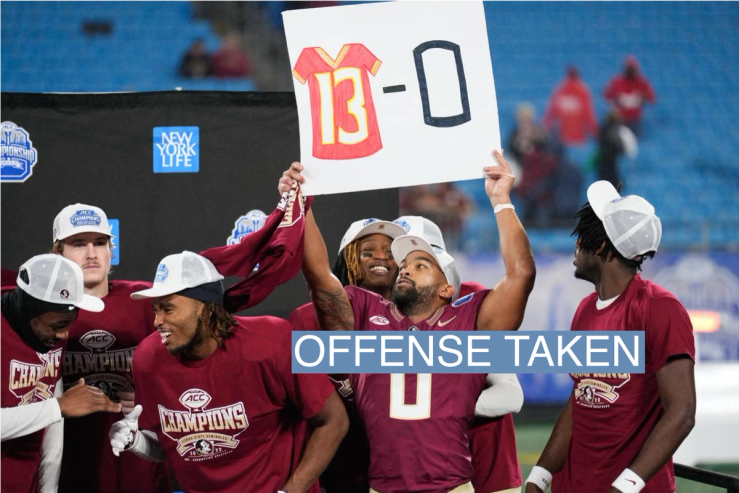The News
The drama surrounding the upcoming College Football Playoff (CFP) entered the political arena Monday, as a host of elected officials demanded answers over why an undefeated team was left out of contention.
The playoff Selection Committee — which decides on the top four teams every year that will vie for the national championship — faced criticism for excluding Florida State University from the top four. FSU went undefeated this season despite losing its quarterback to an injury, but was ultimately ranked behind Texas and Alabama, who each suffered one loss.
Florida politicians are now weighing in. Sen. Rick Scott sent a letter to the committee chairman demanding records on how the ranking was decided. GOP presidential candidates, Gov. Ron DeSantis and former President Donald Trump, also criticized the decision. (Trump said DeSantis is to blame for a “really bad lobbying effort.“)
SIGNALS
College football is like a religion throughout much of the country, and being left out of the playoffs means a school loses out on the economic advantages that come with that. Scott’s letter to the committee argued that there are “hopes, dreams and billions of dollars in economic activity that hinge on the decisions.” Colleges are automatically awarded millions by the CFP for their teams being in championship contention, and see increased revenue from merchandise sales and higher ticket demand.
Unlike many other sports, the playoff decisions are subjective ones, and aren’t based on any sort of impartial calculation. Many analysts and journalists have long called for reforms to the rankings, which are decided by a 13-person panel people behind closed doors and are accused of being based on money and ratings. “This process is about making money. This is not about some honorable calling or cause,” sports commentator Rachel Nichols said. As a result the playoffs go to “the four teams they think can create the most competitive and, frankly, highest rated games.”
Politics has long been embedded in college football. In 1969, Richard Nixon made headlines for visiting a high-profile game in Arkansas to appeal to southern voters amid criticism of the Vietnam War. In 2008, days after being elected, Barack Obama pushed for the creation of the current playoff system, which was established in 2014. Alabama is currently represented in the Senate by Tommy Tuberville, the former Auburn University football coach. Herschel Walker, who unsuccessfully ran for Senate in Georgia last year, cruised to the Republican nomination based largely on his prominence as a University of Georgia football legend. As Slate explained back in 2008, college football and political lobbying have something in common: “the forces of the status quo have been adept at pushing through tough-sounding new rules that don’t fundamentally change the system.”



